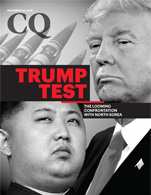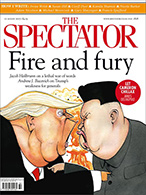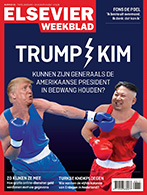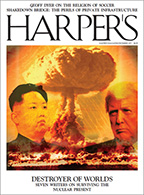- Transition « The First 180 Days « The Second 180 Days of the Trump Administration - July 21-Dec. 31, 2017
Reset: The Second 180 Days
(EMA, revised
Dec. 28, 2017) After a tumultuous first six months in
office, President Trump
recognized the need for a change and implemented a reset. On July
21 the
White House
announced a shake up in its communications team, with financier
Anthony Scaramucci to take on the role of communications director
and Sean Spicer resigning. Trump stated, "We have
accomplished so much, and we are being given credit for so
little. The good news is the people get it, even if the media
doesn’t (+)." On July
28 the White House announced the resignation of chief of staff Reince
Priebus, and his replacement by Homeland Security Secretary John
Kelly. Kelly took the reins on July 31 and Scaramucci was quickly
cut loose (+).
Despite Kelly's appointment, Trump-generated controversies continued. Trump's equivocal response to violence at a white supremacist rally in Charlottesville on Aug. 12 prompted a firestorm (+). On Aug. 18, Trump dismissed White House chief strategist Steve Bannon (+); Bannon returned to Breitbart News. On Aug. 22 Trump was unrestained in speaking at a campaign style rally in Phoenix (>). On Aug. 25 Trump pardoned Joe Arpaio, the controversial former Maricopa County Sheriff who had been found guilty of criminal contempt for ignoring a court order and targeting immigrants. On the political front, in a runoff election on Sept. 26 appointed U.S. Sen. Luther Strange (R-AL), who had been backed by Trump, was defeated by Roy Moore. Also in late September Trump sparked another controversy with a series of Tweets directed at the NFL. On Sept. 29 HHS Secretary Tom Price resigned after criticism over his use of charter flights. There was also considerable speculation that Secretary of State Rex Tillerson might leave the administration after reports that he had called Trump a moron. More controversy came on Nov. 29 Trump re-tweeted three inflammatory anti-Muslim videos posted by the far-right Britain First party. On Dec. 4 Trump endorsed Roy Moore in the U.S. Senate race in Alabama despite the allegations against him. In addition to Trump's failure to exercise moral leadership in instances such as Charlottesville, posting anti-Muslim videos and the Moore endorsement, Trump's prolific lying and misleading is particularly worrisome for its potentially corrosive effects our democracy. Through Nov. 13 (day 298) the Washington Post reported Trump had made 1,628 false and misleading claims, over five per day (>). On Dec. 14 the New York Times reported that in his first 10 months Trump told nearly six times as many falsehoods as Obama did during his entire presidency (1, 2). Although a case can be made that there is bias in the media (>), Trump's continual attacks on "fake news" are also damaging. For example, on Oct. 12 Trump tweeted, "Network news has become so partisan, distorted and fake that licenses must be challenged and, if appropriate, revoked. Not fair to public!"
Always in the background were the ongoing investigations by special counsel Robert Mueller and congressional committees examining looking into possible obstruction of justice, collusion with Russians, and even Trump's business dealings. On Oct. 30 Mueller's investigation produced its first results as former Trump campaign manager Paul Manafort and associate Rick Gates were indicted on 12 counts related to business dealings with the former Russia backed Ukranian leader Victor Yanukovich, including money laundering. Also on Oct. 30 news broke that George Papadopoulos, a Trump campaign foreign policy advisor, had pled guilty to lying about his contacts with Russians. On Dec. 1 former National Security Advisor Michael Flynn pleaded guilty to making misleading statements to the FBI about conversations he had had with the Russian ambassador. Flynn stated he is cooperating with Mueller. Trump continued to charge the investigation was a "witch hunt." He and Republicans sought to play up DNC and Clinton campaign payments to the research firm Fusion GPS for the Christopher Steele dossier on Trump and Russia, and have questioned the impartiality of Mueller's investigation. [Russia Investigation]
The I-word has been bandied about from time to time. On Oct. 20 billionaire Tom Steyer launched a TV ad campaign in which he called for "impeaching and removing a dangerous president." By year's end he had committed $20 million to his "Need to Impeach" effort and was fast approaching four million petition signatures (>). However in Congress there has been little support for such action. Rep. Al Green (D-TX) introduced articles of impeachment on Dec. 6, but the House of Representatives voted to table the resolution in a 364-58 vote.
Reports of serious dysfunction in the White House continue to pop up. On Oct. 8 Sen. Bob Corker (R-TN) tweeted, "It's a shame the White House has become an adult day care center. Someone obviously missed their shift this morning." An Oct. 10 piece by the Los Angeles Times Cathleen Decker reported "“shouting matches” between Trump and chief of staff Kelly. On Oct. 11, Vanity Fair's Gabriel Sherman portrayed Trump as increasingly unfocused and consumed by dark moods (>). Countering this slew of reports, Kellyanne Conway, Counselor to the President, presented a much more rosy picture of the atmosphere in the White House during her appearance at the Values Voter Summit on Oct. 13 (+). In December the New York Times reported Trump watches four hours of television a day and sometimes as many as eight hours (>). On Dec. 28 the Wall Street Journal reported, "Trump White House Saw Record Number of First-Year Staff Departures."
The dysfunction extended into the Executive Branch. At year's end the Partnership for Public Service reported that "of 624 key positions requiring Senate confirmation" 249 still had no nominee (>). Daily Beast reported on Oct. 30 that more than half of 341 nominations Trump has submitted for Senate confirmation "have some notable conflict of interest," including 105 who worked in the industries they are to regulate and 63 who lobbied for those industries (>). High level vacancies—under secretaries and assistant secretaries (>)—as well as resignations at the State Department raised serious concerns among diplomats; addressing the matter in a Nov. 2 interview with Laura Ingraham on Fox News Trump stated, "Let me tell you, the one that matters is me. I'm the only one that matters." CBS News reported on Nov. 21 that the Office of Science and Technology Policy is "a ghost town" with "a fleet of empty desks (>)."
Countering all the negatives is the state of the economy, which has provided a huge boost to Trump. The Conference Board's Consumer Confidence Index® for November "increased for a fifth consecutive month and remains at a 17-year high" (>). GDP has increased at more than 3-percent in both the second and third quarters. The official unemployment rate has been less than 5% throughout Trump's tenure and has trended lower, although it should be noted that it has been on a downward trajectory since peaking in 2009 (>). The stock market has set a series of record highs. Trump frequently points to tthe economy in his speeches and remarks (+). At the Values Voter Summit, for example, Trump noted that, "just on the public markets we've made, since Election Day, $5.2 trillion in value."
| Dow Jones Industrial
Avg. |
S&P 500 |
NASDAQ Composite |
|
| Nov. 8, 2016 |
18,332.74 |
2,139.56 |
5,193.49 |
| Nov. 8, 2017 |
23,563.36 (28.53% incr.) |
2,594.38 (21.26% incr.) |
6,789.12 (23.50% incr.) |
Hurricanes and the mass shooting in Las Vegas provided Trump an opportunity to demonstrate leadership and empathy. (Eleven years previously President George W. Bush took a significant hit over his response to Hurricane Katrina). At the end of August Hurricane and then Tropical Storm Harvey flooded areas in east Texas. Trump and First Lady Melania Trump visited Texas on Aug. 30 and again on Sept. 2. Hurricane Irma started taking shape at the end of August and wound through the Carribean hitting Florida on Sept. 10. Trump and Melania visited on Sept. 14. Hurricane Maria cut a devastating path through the Caribbean hitting Puerto Rico on Sept. 20; Trump took criticism over the response and his visit the island on Oct. 3 did not go over too well. The next day Trump and Melania visited Las Vegas, scene of the shooting massacre, where he met with victims and first responders.
While the ongoing drama of the Trump show kept
grabbing headlines, the administration has been steadily pressing
forward on its policy agenda. Trump has been
announcing waves of judicial candidates, who will shape the courts for
years to come (+). The
administration
has pointed to
success in "cutting hundreds of burdensome and costly regulations" (1, 2).
The
Environmental
Protection
Agency
under
Administrator
Scott Pruitt
has drawn particular attention (+);
critics have dubbed him "public health enemy #1." One of the
EPA's more high profile actions was its announcement on Oct. 10 that it
is proposing to
repeal the Obama Administration's signature "Clean Power Plan" (+).
Trump has continued to push restrictions on immigration. In August he came out in support of a major overhaul of the legal immigration system (+), and on Sept. 5 the administration announced its decision to wind down DACA (Deferred Action for Childhood Arrivals) while calling on Congress to act (+). In late September the administration announced it would cap the number of refugees admitted in FY2018 at 45,000 (+). On Oct. 8 the administration announced a hard line set of immigration policy proposals (+). Following the Oct. 31 attack in New York City by an Uzbek immigrant driving a rental truck, Trump said he would end the diversity visa lottery program (+). The administration has also announced it is terminating Temporary Protected Status (TPS) for Sudan, Nicaragua and Haiti (+). As for Trump's famous wall, eight 30-foot tall prototypes were constructed on the border near San Diego and are undergoing testing (+).
Although the effort to repeal
or repeal and
replace
Obamacare failed, the administration continued to chip away at
the program. In Congress, the effort to repeal, which appeared to
have
collapsed in the Senate (+), re-emerged
with a last-ditch push for Graham-Cassidy legislation (+) heading
to a Sept. 30 procedural deadline. This again fell short and
leadership did not put it to a vote. On Oct.
12 Trump signed an executive order expanding access to association
health plans, "to make these affordable, flexible plans much more
widely available (+)," and the
administration also announced "that cost-sharing reductions payments
will be discontinued immediately based on a legal opinion from the
Attorney General (+)." Another
significant blow to the ACA came in late December when the final
version of the Tax Cuts and Jobs Act eliminated individual
mandate.
Partisanship remains as bad as ever under Trump.
Trump did make a few overtures to Democratic leadership in
Congress. The first of these surprise moves came on
Sept. 6 when to the consternation of Republican
leaders, Trump and Democratic congressional leaders reached an
agreement Harvey aid and a short term debt limit increase (+). On
Sept. 13 Trump dined with
Senate Minority Leader Chuck Schumer and House Minority Leader Nancy
Pelosi at the White House; the Democrats reported a deal on
DACA but details were murky. Subsequently they rejected the
administration's announcement of immigration policy proposals (+), and at
year's end the issue remained unresolved. On Oct. 7 Trump
tweeted, "I
called Chuck Schumer yesterday to
see if the Dems want to do a great HealthCare Bill. ObamaCare is badly
broken, big premiums. Who knows!" Nothing came of his words on
DACA
and health care.
The escalating situation over the nuclear program of
North Korea and its tyrannical leader Kim-Jong Un proved particularly
worrisome. As North Korea continued its missile launches, the
U.N. Security Council
on Aug. 5 passed new sanctions. On Aug. 8 speaking from
Bedminster, NJ, Trump warned, "They will be met with fire and fury like
the world has never seen." North Korea continued to up the ante,
including threats to Guam, an Aug. 29 intermediate range missile that
went over Japan, a Sept. 3
hydrogen bomb test, and another missile over Japan on Sept. 15.
In his wide-ranging Sept. 19 speech at the UN General Assembly, Trump
said Kim-Jong Un's regime "threatens the entire world" and if it went
too far the U.S. would "totally destroy North Korea." "Rocket Man
is on a suicide mission for himself," Trump declared. On Dec. 22
the UN Security Council unanimously approved even tighter sanctions (+).
There was much speculation that Trump would decertify the 2015 nuclear deal with Iran. During his campaign he had repeatedly called the deal "one of the worst and most one-sided transactions the United States has ever entered into." On Oct. 13, asserting, "The Iranian regime has committed multiple violations of the agreement," Trump announced a new policy towards Iran (+). He stated he would work with Congress and our allies, but that the agreement would be "under continuous review, and our participation can be cancelled by me, as President, at any time."
Also in the foreign policy realm, in late
July both Houses of Congress overwhelmingly passed the
"Countering
America's Adversaries Through Sanctions Act" (H.R.
3364), which Trump signed, imposing sanctions on
Iran, Russia and North Korea (+).
Russia responded
by requiring that 755 U.S. diplomats leave by Sept. 1. On Aug. 21
Trump delivered a sober, well-written speech on
strategy in Afghanistan and South Asia. He acknowledged that, "My
original instinct was to pull out -- and, historically, I like
following my instincts." He went on to state, "A hasty
withdrawal would create a vacuum that terrorists, including
ISIS and al Qaeda, would instantly fill, just as happened before
September 11th." On Oct. 12
the State Department announced
that the United States would
withdraw as a member of UNESCO effective Dec. 31, 2018, citing in part
the organization's
"continuing anti-Israel bias." On
Nov.
3,
Trump
left
on
an
12-day,
5-nation
trip to Asia, the longest overseas trip of his presidency (+). On Dec. 6 Trump announced the
United States would recognize Jerusalem as the capital of Israel and
move the embassy there.
Despite the failure of Obamacare repeal, Republican
leaders pushed ahead on another big, difficult issue: tax reform (+). Few people disagreed that the
tax code was in need of an overhaul, but this would be a very heavy
lift;
the last successful tax overhaul occurred in 1986. Trump set
an aggressive timetable,
stating, "We are working to give the American people a giant tax cut
for Christmas. We are giving them a big beautiful Christmas
present in the form of a tremendous tax cut.”
Like the health care effort, Republican
leaders produced "tax reform" legislation in secret, without hearings
and without
any
Democratic cooperation (1, 2, 3).
Unlike
the
Obamacare
effort
Republicans
succeeded,
however.
Just
50
days passed between Nov. 2, when Rep. Kevin Brady (R-TX)
introduced the "Tax Cuts and Jobs Act in the the Ways and Means
Committee promising
tax
relief
to
"Americans
across the country – especially low- and middle-income Americans" and
to "businesses of all sizes" (+) and
Dec. 22 when President Trump signed it into law. Congressional
Republicans rammed the
bill through markup sessions and a show conference committee, obviating
serious discussion with the Democrats. On such a
far-reaching piece of legislation ways could and should have been found
to work with the Democrats. Meanwhile lobbyists had a field day (>), and
promises of tax simplification
fell by the wayside. Both sides earned Pinnochios as the bill
moved through Congress, but the way Republicans sold the bill was
particularly disingenuous. All the talk about middle class tax
cuts and jobs could not disguise
the fact that the driving force was corporate taxes. As Rep. Mark
Sanford (R-SC) told the Washington
Post's Erica Werner,
"From
a truth-in-advertising standpoint it would have been a lot simpler
if we just acknowledged reality on this bill, which is it’s
fundamentally a corporate tax
reduction and restructuring bill, period (>).”
The
cornerstone
of
the
bill
that
finally
went
to
the President's desk is a cut in the corporate
rate
from 35% to 21%. A
good
argument
can
be made that the corporate tax rate needed to be
reduced, but this legislation will add an estimated $1.5
trillion to the
national debt, and fiscal watchdogs note that it is replete with
gimmicks which could increase the cost even more. Rather than
"tax reform" Republicans have produced a "rearranging
of the deck chairs;" the tax code will still be extremely complicated
and filled with loopholes. [tax
reform
timeline]
The Nov. 7, 2017 off-year elections produced significant Democratic victories (+), and the defeat of Roy Moore in the Dec. 12 U.S. Senate special election in Alabama added to Republican jitters (+). There was much talk about the possibility of a Democratic wave in 2018. "Tax reform" gives the Republicans a big accomplishment heading into the 2018 mid-term elections, but whether it helps or hurts remains to be seen. At year's end the Republican "tax reform" was decidedly unpopular and Democrats saw it as an asset. In 2018 there will be a lot of campaigning to shape public perceptions of the "tax reform."
As 2017 drew to a close Congress again faced the
challenge of passing a bill to fund the government. They punted
again. In Sept. 2017 Trump's surprise deal produced a
continuing resolution (+). As the
new deadline of Dec. 8 approached there
was considerable concern about the possibility of a
government shutdown (+). On Dec. 7
Congress passed a short term spending bill to keep the
government running through Dec. 22. On Dec. 21 they passed
another
to carry the government through Jan. 19, 2018.
In sum 2017 was a consequential year. The Trump
administration and Republicans can point
to successes in cutting regulations, reshaping the judiciary and
making major changes to the tax system (+), which they say will boost
economic growth.
Critics wonder if our democracy can survive the incessant assaults on
truth.
And the Mueller
investigation continues.
Magazine covers have
portrayed international concern over North Korean missile and nuclear
testing as a confrontation between President Donald Trump and North
Korean leader Kim-Jong Un.
 |
 |
 |
 |
 |
 |
| Nov. 28, 2016 |
Apr. 22, 2017 |
Aug. 8, 2017 |
Aug. 12, 2017 |
Aug. 19, 2017 |
Sept. 19, 2017 |
 |
|||||
| Dec. 2017 |

